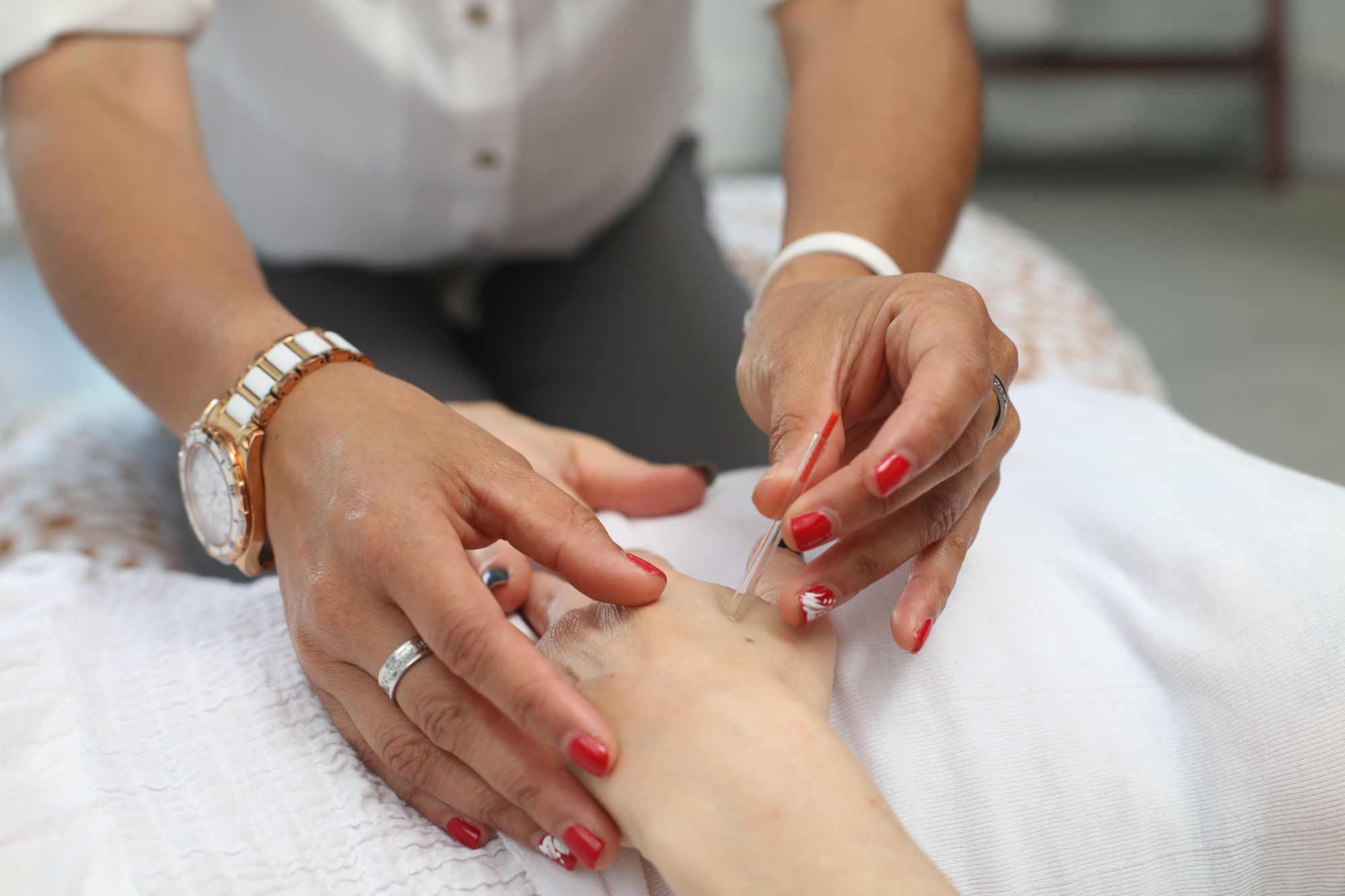How to handle sexual problems (and get your sex life back on track)
updated on Jul 16, 2021

The results are in: we’re officially having less sex than ever - but not through choice. Could our trouble discussing our sexual worries be getting in the way of having a good time?
Sex. It’s not something we really talk about as a nation, is it? For many of us Brits, talking about sex is right up there with discussing our finances and actually confronting queue jumpers instead of tutting angrily. Somehow, sex has been relegated to something we don’t talk about in polite company. Why is that? Sex is great!
According to researchers from the London School of Hygiene and Tropical Medicine, our decline in having sex isn’t because we’re feeling less inclined to have a little quality alone time with our partner(s). Half of women and nearly two-thirds of men would like to be having more sex, but due to our busy schedules, stress, and feelings of exhaustion, we just aren’t making it a priority.
Could we be unwittingly missing out on the health benefits of regular sexual release, and could our reluctance to speak about of sex-related worried be making things seem that much more scary?

The benefits of sex - it’s more than just gratification
Don’t just take my word for it - science has been proving the benefits of a healthy sex life for years. According to the NHS, sexual arousal is good for your heart, penetrative sex can act as a stress buster, plus other forms of orgasms can help you feel more relaxed in similar ways to exercise or meditation.
The feel-good hormones released during sex can also temporarily help reduce symptoms of anxiety and depression. The increase in physical activity that often comes with intimate relations can also help you to get a better night’s sleep, particularly if you orgasm as this releases prolactin (a hormone that makes you sleepier).
Sexual arousal and orgasm can also boost your oxytocin (the hormone that helps you feel connected to your partner) whilst lowering cortisol (a stress-related hormone). It’s a win-win. Sex just once or twice a week can help you fend off illness and boost your immune system, whilst those who have sex report a better sense of wellbeing and feeling healthier.
Doing the deed isn’t the only part of sexual relations that can benefit us. Hugging can help lower your heart rate and blood pressure, not to mention the benefits of feeling loved and supported; according to one study of 10,000 men, those who felt “loved and supported” faced a reduced risk of angina regardless of age and blood pressure.
Being single doesn’t have to present a problem. Masturbating can release the same feel-good hormones we benefit from with others, along with the added benefit of allowing us to better explore our own bodies, helping us figure out what we do (and don’t) like. Studies have even suggested a little solo fun can help you improve your body image.
The benefits don’t stop there. For men, more frequent ejaculation has seen evidence of decreased chances of a prostate cancer diagnosis before 70. For women, the benefits can be even greater. Sexual activity has shown to help relieve menstrual cramps, improve fertility, help strengthen pelvic muscles and vaginal lubrication, decrease incontinence, and even protect against endometriosis.

Encountering sexual problems
Sexual problems can affect anyone, at any time, regardless of age, sexual preferences, or experiences. Nearly half a million of us are diagnosed with an STI each year. Only one in three of us are satisfied with our sex lives, with nearly a fifth of us experiencing a different sex drive from our partners that we feel has put a strain on our relationships.
The Let’s Talk About Sex report revealed that one in three UK adults have experienced a sexual problem. It may not feel like it, but we aren’t alone. Sexual problems are more common than we may realise. What’s important is recognising when we encounter an issue that we need to talk, find out more, or seek support with.
5 common sexual problems (and how to handle them)
1. Decreasing sex drive and impotence
A loss of libido or decreased desire for sex can be particularly common for women during certain times in their lives. If you are feeling depressed, are pregnant or recently gave birth, these can all be common factors that may affect your sex drive.
Other psychological or physical factors can affect men and women. Diabetes, hormone disorders, depression, tiredness, as well as addiction (drug or alcohol) are all issues that can lead to a loss of libido. Relationship problems or past sexual experiences can also impact your desire for intercourse.
While a decrease in sexual desire isn’t necessarily a cause for concern, if you are worried it may be affecting your relationship, causing disappointment, arguments, or even leaving you feeling like you may be drifting apart, it could be time to seek help.
Psychosexual therapy offers the chance to speak with a specially trained therapist who can help you explore and overcome sexual dysfunctions. Knowledgeable in a wide range of sexual problems with individuals of all ages, a psychosexual counsellor can help you to better recognise your sexual needs and desires, working through negative thoughts that may be affecting your ability to enjoy sex and intimacy.
Relationship counselling can be another form of talking therapy that can help you and your partner(s) to explore how you are communicating physically and verbally. Helping you to identify areas which may be affecting your ability to feel safe, relaxed, and able to enjoy sex, relationship counselling can help you to become more aware of each other’s needs, working together to find a solution that fits.
Talking therapies aren’t the only options to help handle your sex drive. Yoga can have a surprising benefit on not only your health and sense of wellbeing, but also on your sex drive. According to one study published in The Journal of Sexual Medicine, regular yoga practice can improve women’s levels of sexual desire. The study revealed 75% of participants sex lives improved significantly, particularly for women in their 40s and older.
If stress, anxiety, or depression is affecting your sex drive, hypnotherapy may be able to help. A clinical hypnotherapist may be able to help you handle related symptoms, as well as improve your confidence or sense of self-worth. Hypnotherapy can help some people connect with their subconscious mind, addressing events or issues that may be affecting their mood, self-esteem, or enjoyment in life.
What we eat can be something we overlook when it comes to considering our overall health and wellbeing. If stress may be affecting your sex drive, it could be worth considering what you’re eating.
Nutritionists can offer natural, healthy, simple tips and advice for how we can reduce our stress levels through our eating habits. Remembering to eat regularly, keep refined carbs for treats, and include enough protein in our diets can all have a surprising impact on how we are feeling.
If you are concerned about potential erectile dysfunction or impotence, speaking with your GP can be the first step towards finding the option that works for you. Visiting a sexual health clinic can also provide the same treatment you would receive with your GP, with most offering walk-in services and quicker results.
Common in men over 40, this is usually nothing to worry about, however, if the issue persists, your GP is the best port of call. Most frequently due to stress, anxiety, tiredness, or how much you drink, erection problems can also be caused by physical or emotional problems.

2. Sex addiction
While people have joked about being nymphomaniacs and sex addicts for quite some time, the World Health Organisation (WHO) has only recently accepted sex addiction as a recognised mental health condition. Also known as compulsive sexual behaviour, many experts hope that this official recognition will help dispel the shame and worry that may be stopping individuals from seeking help and support.
But how do you know if you are a sex addict? And how do you begin seeking support? Counsellor and Vice-Chair of the Association for the Treatment of Sexual Addiction and Compulsivity (ATSAC), Ian Baker, explains how identifying sex addiction isn’t as simple as assessing how much porn you watch, or how frequently you masturbate.
“You don’t just say you’re a sex addict because you watch an hour of porn a day. I’m not here to say masturbation is wrong, or fetishes are wrong, because someone’s sexual identity is important.
“It’s how it is affecting other parts of your life. Are you dropping friends? Are you not picking up your kids because of this? Are you using it to manage low mood or anxiety? [Speaking with a counsellor and gaining a diagnosis] isn't walking in and saying ‘you’re sleeping with sex workers - you’re a sex addict.’”
Signs of sex addiction can include frequently seeking casual sex, having multiple affairs, excessively using pornography, experiencing feelings of guilt after sex, obsessive thoughts around sex or planning sexual encounters.
If you are concerned about how your relationship with sex, masturbation or pornography is impacting other areas of your life, there are a number of different places you can turn for help.
Working with a psychosexual therapist or a relationship counsellor can help you to better identify, accept and change behaviours that may be affecting other areas of your life. Psychosexual therapy (also known as sex therapy) can help you improve physical intimacy with your partner; manage sexual difficulties; identify physical, psychological, emotional, or situational causes of sexual issues.
If you have recognised you have a problem and are seeking to make positive changes, working with a hypnotherapist for sex addiction can be another option. Helping you to change the thought patterns and behaviours that may be causing you problems, a clinical hypnotherapist will use the power of suggestion to help you alter how you think and react to certain situations.
Taking into consideration your potential triggers, past experiences and lifestyle, your hypnotherapist can tailor your sessions to you, helping you break out of the negative cycle you have become caught up in.

3. Premature ejaculation
Coming too quickly (known as rapid or premature ejaculation) is a common ejaculation problem. While there is no standard or right length of time for sex to last, one study revealed the average time it takes for a man to ejaculate after beginning penetrative intercourse is around five and a half minutes.
Common causes of problems with ejaculation can include depression, stress, anxiety about performance, and relationship problems, as well as physical issues such as recreational drugs, prostate or thyroid problems.
International guidelines say regularly coming within one minute of entering your partner is considered to be premature ejaculation. While studies have found that premature ejaculation can have any impact on all parties involved, it’s worth noting that there isn’t a right or wrong way to achieve mutual sexual gratification. It’s completely up to you (and your partner) to find what you are happy with. If the time taken to come is causing you distress or emotional turmoil, it could be worth seeking advice.
Speaking with your GP can help you to identify and treat potential physical and underlying conditions. Your GP may be able to offer medication options such as selective serotonin reuptake inhibitors (SSRIs), though they may suggest you try self-help options first.
If you are unsure about seeking professional advice, there are a number of self-help options you can also try (though speaking with an expert is always advised). Self-help options can include:
- Switching to thick condoms to decrease sensation
- Masturbating up to two hours before intercourse
- Taking breaks during sex to distract yourself and prolong the experience
Couples therapy can be another option for those in a long-term relationship. A therapist can help you work towards improving your communication, speaking openly about issues that may be causing you stress or distress, as well as helping you to become more mindful in the moment.
Another complementary option that studies have shown may help includes acupuncture. Using fine needles to balance the energy levels within your body, acupuncture can be used to help treat sexual performance, reduce stress and balance hormone levels. Techniques can also be used to prolong sexual performance and boost your sex drive.

4. Pain during sex
Feeling pain or discomfort during or after sex is most often a sign that something is wrong and shouldn’t be ignored. This pain may be caused by an infection, illness, physical or psychological problem. If you are experiencing pain or discomfort, it’s important to speak with your GP or visit a sexual health clinic.
For women, changing hormone levels during the menopause can cause new vaginal dryness in a third of women that may lead to pain, as well a uncomfortable hot flushes, trouble sleeping, and other symptoms. Hormone replacement therapy (HRT) or SSRIs may be two options you’re offered. Trying over the counter lubricants and moisturising creams from pharmacies may also help.
For men, pain during sex (also known as dyspareunia) is less common, but may occur during or after ejaculation. As causes can be physical or psychological, it is always worth checking with a medical professional before trying complementary or alternative therapies. Hypnotherapy for pain management can help some individuals change their thought patterns surrounding pain, helping them to perceive pain in a different way.
Life coach and podcaster Ben Bidwell, better known as The Naked Professor, shares his own experiences with dyspareunia.
5. Boredom or differing libidos
Feeling bored in the bedroom or having vastly different libidos can have a significant impact on both our relationships and sense of wellbeing. Differing sex drives can lead to partners feeling guilty that they may not be satisfying their other half, or worry that their partner no longer finds them attractive.
Counsellor Graeme recommends speaking with your partner as one of the best courses of action. “Talking to your partner about your relationship and the sexual side is very important. If [you] don’t discuss how [you’re] feeling, then misunderstandings inevitably appear as you assign thoughts and feelings to your partner.
“It can be difficult to talk about, but in the long run being honest bout how you feel is going to allow you to be clear about what can and cannot change. It’s important to recognise that there is an element of reality that you can’t change. Libido is another part that needs to be integrated into the relationship, and will require negotiation and compromise.
“While relationship counselling and visiting health care professionals can be useful, remember that it is your relationship so only you and your partner will know what it is like to be in that relationship ad how it can work. Outsides can help when it is difficult to talk to each other, but they cannot decide what is right for you.”
If you are worried that your differing libidos may be causing problems, there are a number of natural ways to increase your sex drive. One option, herbalism, can help you regain your balance, counteract illness and stress (both of which can affect your libido). Tracking what you eat can also help you to counter signs of stress, improve blood flow, and promote the release of endorphins.
Try eating more almonds and walnuts to increase your mineral intake and help combat stress, or switch your regular sweet treats for dark chocolate. Containing phenylethylamine, this amino acid promotes the release of endorphins and can help naturally boost your libido.

Making sure you’re getting enough sleep can also help to increase your sex drive. Try exchanging massages with your partner; this can not only help ease tension and lower stress levels, but can help you to feel closer to each other and may act as a simple catalyst for more frisky activities.
Worried boredom and routine may be settling into your bedroom romps? Counsellor Jo explains why and how sexual boredom can occur, and what you can do to get past it. Sex and relationship psychotherapist, Thomas, explains more about sexual desire and the search for ourselves in relationships.
“Sexual desire doesn’t happen in isolation. We live in a highly sexualised culture, yet more and more people are unhappy with their sex lives and are unsure what to do about it.
“It’s difficult and confusing to be present and always in touch with our true self. It’s an ongoing discovery between who you are, who you think you should be, and who you want to become.
“Sexual desire is an aspect of a person’s sexuality. It varies significantly from one person to another, and also varies depending on circumstances as a particular time. It’s constantly moving and complex. It can be aroused through imagination and sexual fantasies, or perceiving an individual that one finds attractive.
“Sexual desire can shift from intensely positive, to neutral, to intensely negative. It’s normal for our desire to go up and down at different times in our lives. The main issue is if this is causing you distress, that you are able to discuss it and find a way to reduce this distress.”
Answering your unasked questions
If you’re worried about a sex-related issue we haven’t covered above, check out these sex and intimacy questions, as answered by sex and relationship therapist Lohani Noor from the hit BBC Three show, Sex on the Couch. In the article, Lohani also shares her three top tips for talking about sex with your partner.
For more information about relationship counselling and hypnotherapy for sexual problems, visit Counselling Directory or Hypnotherapy Directory.

